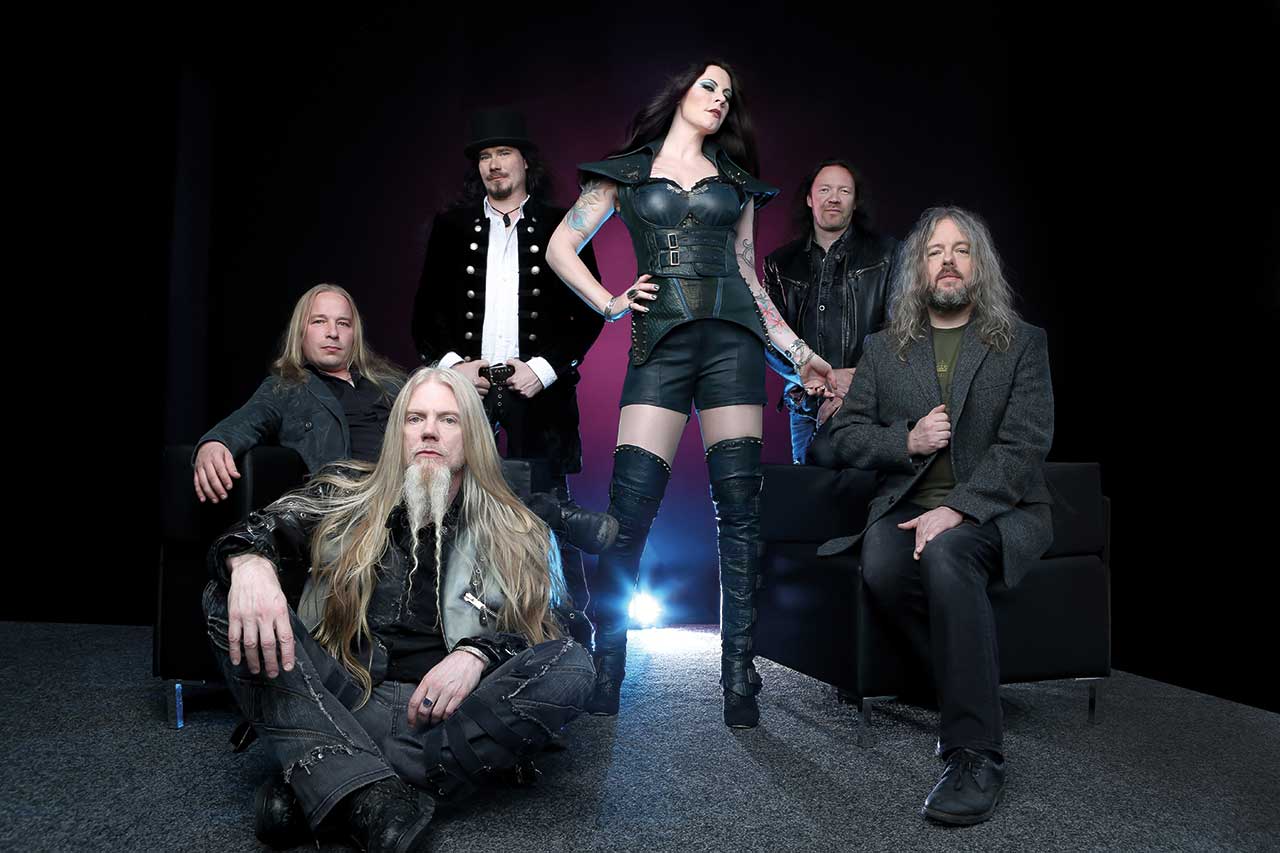Floor Jansen can remember the first time she took on the knuckleheads and won. It was the early 00s, and her band, After Forever, were part of a tour whose bill featured a mix-and-match assortment of other, exclusively male, European metal outfits. The presence of a female singer on stage was apparently too much for some, frequently sending the less- enlightened members of the crowd into a testosterone-fuelled meltdown.
“I’d get shit from the audience all the time,” she says. “‘Oh look, there’s a woman up there.’ In the beginning, I thought it was just part of it. But it soon became, ‘Really?’ They’d either be screaming ‘Slayer!’ or ‘Boobs!’ ‘OK, we’re not Slayer and I have boobs – very perceptive of you, can we move on now?’”
Given that the woman their unwanted attentions were focused on was, in her own words, “headstrong and forceful and not afraid to call people out”, it was inevitable that things were going to come to a head at some point. Floor can’t remember the date, or even the venue when it happened, but she vividly recalls how the confrontation played out.
“This guy was just constantly shouting stupid stuff at me: ‘[Moronic Beavis And Butt-Head voice] UH, BOOBS!’ This guy would not shut up. Eventually, I just said: ‘Seeing as you have such a big mouth on you, why don’t you come and tell me all these things to my face after the show?’”
There was, she says, a mass intake of breath from the audience. A six- foot Dutch woman armed with a fearsome death stare and a reservoir of patience about to run dry had just publicly offered out a drunken troglodyte. There was only ever going to be one winner in this smackdown.
“Yeah, I picked a fight with that guy from the stage,” she says. “It worked like a charm. He didn’t say another word.” She arches a dismissive eyebrow. “If you want to be that stupid, by all means do it. But you don’t deserve my attention.”
Given the snootiness sometimes directed towards it, it’s ironic that symphonic metal has been at the forefront of the battle for gender equality for the last 20 years. There are few other genres where women are afforded such a prominent role, from Within Temptation’s Sharon den Adel and Epica’s Simone Simons to Floor herself. And while it’s still chiefly dominated by men – the driving force behind Floor’s current band, Nightwish, is undeniably keyboard player and composer Tuomas Holopainen – it’s far less exclusive than many other supposedly more progressive strands of music.

Floor herself blanches at the idea of being anyone’s figurehead, though that’s as much down to modesty as a reluctance to be a gender warrior. “There are people who consider me a role model, I suppose,” she says. “At first I thought… [makes a dismissive noise], but then I thought, ‘Maybe this is flattering.’ I don’t want people to copy me. I want you to like you. You’re already good enough. Anyway, I don’t want people to think that being me is all great.”
We’re sitting in an ice-cold photo studio on an industrial estate on the outskirts of Gothenburg. Floor lives half an hour’s drive away, with her partner, Sabaton drummer Hannes van Dahl, and their 10-month-old baby daughter, Freja.
It’s the first week of January. In a few days’ time, Floor will meet up with her bandmates in Nightwish to discuss the forthcoming US and European tours in support of their new greatest hits album, Decades. It will be the first time they’ve been together since the end of 2016, when they embarked on a year-long break. For the singer, the prearranged hiatus and her pregnancy dovetailed perfectly – though not in the most obvious way.
“I think a lot of people think I had the year off because of my pregnancy,” she says. “But the pregnancy was because we had a year off. That’s a very important order.”
When the break was first mooted, she wasn’t keen on the idea. She had only been in the band a few years, and her batteries were still fully charged. “It wasn’t a point where I thought, ‘Yeah, let’s have a break.’ It was more like, ‘Oh shit…’”
But an idea began to germinate in the back of her mind. She and Hannes had talked about having children, and this could be the perfect window of opportunity.
“You’re in a band of six people,” she says. “If one person decides to just do something, it affects everybody else. Then I started to think, ‘Hmmm, a year off could be the time.’ But even that presents its own challenges, ha ha ha! There’s only so much planning you can do when it comes to pregnancies, y’know…”
Onstage and on record, Floor is a commanding figure. Her voice – powerful but emotional, strident yet pliable – is a controlled force of nature. Today, perched cross-legged on a low chair, she’s friendly and open, even if the whiff of steeliness still surrounds her. She admits that she’s impatient and has a low tolerance for idiots.
“Everybody meets a lot of idiots in their line of work, not just in music,” she says. “But I’m an impatient person. That can make everybody an idiot pretty soon. So that’s not fair.”
What Floor Jansen definitely is not is a diva, at least not today. The ‘d’-word has plagued her for several years. It’s an accusation that has been brandished as a weapon by people who seem unable to comprehend that a woman in her position is entitled to refuse to stand for bullshit. In 2014, she felt obliged to post an open letter online in response to criticism of how she dealt with fans. The letter’s contents were summed up in the typically blunt line: “I am not an arrogant bitch.” (A sentiment a male contemporary would never have to express.)
“That upset me terribly, just having to write it,” she says, looking genuinely pained. “Because I felt so misunderstood. But I stand by it. People think that when they come up to me, screaming things into my ear, that I will respond according to what they want. I’ll turn around and smile and take the photo. But I’m not somebody’s marionette. Just because I sing in a band, people don’t get to dictate whatever the fuck they want from me.”
She rarely uses social media these days. She hasn’t been on Twitter for months, if not years, and she can barely hide her contempt for those singers of either gender who “post 12 photos of themselves posing on Instagram every day”. She’s been the target of the kind of apoplectic online fury that certain metal fans serve up so well, not least after a Hammer interview in which she called Slayer “a dreadful band”.
“The whole social media thing is ridiculous,” she says, rolling her eyes in exasperation. “Everybody gets to say what they want all the time. That’s fine in theory, but it’s not civilised. Imagine going into a bar and everybody in that bar is talking like people do online. They’d just get their teeth punched in. Social media, it’s…”
She looks so exasperated she can barely be bothered to describe it. Brilliantly, she makes one long raspberry noise instead.

She hasn’t always been this bullet- proof. As a teenager finding her voice, she had the usual mix of confidence and insecurity. Physically, her height was a benefit when it came to singing – she had power and presence even then. But it also meant that she stood out from her peers.
“I was tall, and I was teased for it for a long time,” she says. “There was serious bullying for many years. It was not nice. I was a loner for a long time. I only had one or two friends.”
Music provided solace. She signed up for her high school’s musical production of Joseph And The Amazing Technicolor Dreamcoat. “That’s where I started to connect to people who didn’t really care about any of the things that apparently upset other people, like I was really tall or I had a different accent because I came from a different area.”
In 1999, the year she graduated from school, Floor enlisted at the Rock Academy, a brand new music institute in the Dutch city of Tilburg set up to nurture homegrown talent (fellow students in that inaugural year included members of the rock band Krezip and rapper Cilvaringz, who, bizarrely, went on be part of the Wu-Tang family).
“Everybody applied for it, but there were only 40 or 50 spaces, so the chances were very limited,” she says. “But I got in. The downside was that it was not really developed yet, so we were seriously guinea pigs. I didn’t really learn enough.”
She had other things on her plate. By that time she was already a member of After Forever, one of the first wave of prominent symphonic metal bands to emerge in the 1990s. She’d joined a couple of years earlier, at the age of 16. Such a predominantly male environment – a 1990s metal band – might have been an intimidating proposition for a teenage girl with no experience of the music industry. She dismisses the notion.
“I thought it was pretty easy,” she says, shrugging. “I’ve always considered myself one of the guys, without being a tomboy. Being tall helps, and not being offended that easily, without having to just accept certain things. The whole #metoo thing never really got anywhere close to me in that sense. Mainly because I was 1.83m tall and definitely had a mouth on me.”
After Forever had a good run. They cultivated a large fanbase in mainland Europe, even if they were never as big as the likes of Nightwish. But when the end came in 2009, it hit Floor hard.
“The engine was broken,” she says ruefully. “We took a break to see if we could cut loose some parts and fix it, but unfortunately I was the only one who wanted that. For me, it felt like a huge knife in the back.”
Her troubles weren’t helped by the financial crisis that had just hit. Once she’d been able to help support herself by teaching singing masterclasses or appearing on the odd tribute album. Suddenly, the extra work dried up.
“I was pushing 30, I knew how much effort it takes to bring up a new band from scratch,” she says. “I thought, ‘Do I want to do that again? Do I want to sing different kinds of music? Do I want a complete career switch?’ It was not a cool time.”
She dusted herself down and dived back into the fray with a new band, ReVamp, releasing their self-titled debut album in 2010. “I wanted something even heavier than before, something uncompromising,” she says. “And then I had my burnout.”
‘Burnout’ is the name that the Dutch give to a physical and mental condition bought on by a combination of stress, overwork, tiredness and other, related things. It sits somewhere between nervous exhaustion and clinical depression, and it is a genuine problem in the Netherlands – according to a 2016 report, one in 17 people suffer from it.
“Your stress levels stay high, disrupting your hormone balance,” she says. “You make adrenaline through the day and you go through highs and lows, highs and lows. With a burnout, you don’t have those lows any more. Your body keeps producing the highs – you can’t relax. And you can’t keep that up, so you become really tired. That results in all kinds of weird things.”
For Floor, the symptoms were debilitating. She started to get throat infections regularly, which she had never had before. Her breath became short. She found it difficult to climb stairs. “You become so tired that you lose your lust for life,” she says. “I had tests and my heart rate, lung capacity, everything looked good. But it was obvious something was wrong. I looked like shit and I felt like shit.”
This was, she says, the only time in her life that she came close to quitting music. “I hated it,” she says. “I found it terrible. I didn’t want to listen to it, I couldn’t sing, I had a breakdown every time I tried. But I was just too stubborn to give it up.”
Instead, she eased back her workload with ReVamp and began teaching a little bit here and there. The band had started work on a second album just before she’d become ill and she tentatively began to pick that up as an aid to recovery. Slowly, she started to feel better. Her old confidence returned. She prepared to relaunch the next stage of ReVamp.
And then she got the phone call that would change her life.

The first time Floor stepped onstage with Nightwish was at the Showbox in Seattle, on October 1, 2012. The band’s most recent singer, Anette Olzon, had left suddenly just two days before, mid-tour (in a reversal of Floor’s own situation, Anette later claimed she had been fired because she told the band she was pregnant, a claim they strenuously denied).
Floor received the fateful phone call at her sister’s wedding. She knew Tuomas and Nightwish after touring with them a decade earlier in After Forever. She was familiar with their music, too. But not so familiar that she didn’t need a crash course on the journey over.
“When they asked me to fly over and do it, I said, ‘Yes, OK, I’ll do it,’” she says. “Was I cocky about it? No. Well, maybe. You need a kind of cockiness to be able to go, ‘Yes, I want to join one of the biggest bands in this genre, and no, I don’t know the setlist yet.’”
She arrived to find the band in full- on firefighting mode. Their priority was simply to finish the tour; there was no question of this being an audition for the role of frontwoman.
“Absolutely not,” she says. “At that point it was really, ‘How are we going to make this work?’ I certainly didn’t think, ‘Well, now I’m the new singer of Nightwish’, I really didn’t. I thought it was cool that they called me out of all the people in the world it could have been. But it wasn’t a happy time; they weren’t exactly feeling great.”
The offer to join Nightwish full time came 10 months later. The conversation happened in a hotel bar after an appearance at a festival in the Finnish city of Tampere. “I said yes, I laughed, I cried… and then I couldn’t say anything to anyone,” she says. “It wasn’t even a conversation with all of the band. So I had to pretend we had just talked about the setlist for the next show or something.”
She dismisses the suggestion that joining Nightwish was her last roll of the dice. “ReVamp were still going at that point,” she says. “And I’m too much of a fighter to think, ‘Fuck it.’ I wasn’t done yet.”
She notes that she received an email from Anette Olzon when the announcement was made public. “She wrote to wish me luck. That was cool.”
Floor’s relationship with Anette and especially original singer Tarja Turunen is different to the one that her male bandmates have with them. In November 2013, at the Metal Female Voices festival in Belgium, she and Tarja duetted together on a cover of 80s guitar hero Gary Moore’s Over The Hills And Far Away (which was covered by Nightwish in 2001). At the end of 2017, the pair teamed up again for a version of Spanish-language Xmas song Feliz Navidad. She points out that the two of them always got on, even after Tarja was fired from the band in 2005. Do they avoid talking about certain subjects whenever they meet?
“No,” she says after a pause.
Do you talk about your individual experiences in Nightwish?
“Yes, actually, we do. But what I don’t want is any of their stuff to come into it. What she and the guys had, and what happened, is between them, and not with me. I’ll leave it at that.”

Nightwish’s new compilation, Decades, officially marks the end of their year off. A two-disc retrospective arranged in reverse chronological order, it covers the three distinct eras of the band (four if you count the huge step-change between their third and fourth albums, the Tarja-fronted Wishmaster and Century Child). For Floor, it’s a celebration of her time in the band, but also of her place in a bigger history. She says that there were discussions about her re-recording some of the earlier songs, but that idea was swiftly dispensed with.
“That would be like rewriting time. It would be like…” – she reaches for an appropriate comparison – “… writing the history of England and replacing Queen Elizabeth with her sister. These songs are already out there. And it’s not even a respect thing on my part. These songs are part of the Nightwish story, as much as the soap opera stuff.”
There are plans for a new studio album, she says, though they mostly reside in Tuomas Holopainen’s head at this stage. “He’s a force of nature – he just has to write. I know from conversations we’ve had on email and on the phone that he’s been getting stuff together, but I haven’t heard any of it yet. Getting a tour like this started [the Decades tour, which includes a headlining appearance at Bloodstock in August] is our complete focus. 2019 will be a good year for a new album, but first things first.”
Symphonic metal’s attempt at gender equality doesn’t quite extend towards Nightwish’s songwriting process, which is largely in the hands of Tuomas. Floor puts this down to the fact that the band is one person’s vision rather than endemic sexism.
“If I had something that would really add to what we have, I am sure Tuomas would be open for it,” she says. “But the way he writes, it’s not very necessary. He’s just so good. And his sound is the Nightwish sound.”
She sounds entirely comfortable with the notion. If she wasn’t, you suspect her bandmate would be the first to know about it. You don’t get this far by surrounding yourself with idiots and fools. Floor Jansen might not willingly wear the mantle of figurehead for female musicians everywhere, but sometimes actions speak louder than words.
This article originally appeared in Metal Hammer issue 306

